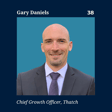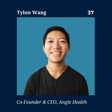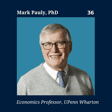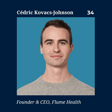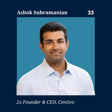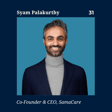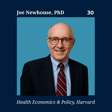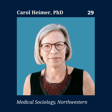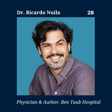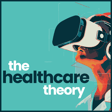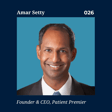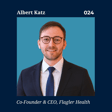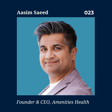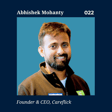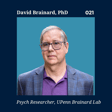Introduction to Healthcare Entrepreneurship Podcast
00:00:00
Speaker
Welcome to the healthcare theory podcast. I'm your host, Nikhil Reddy. And every week we interview the entrepreneurs and thought leaders behind the future of healthcare care to see what's gone wrong with our system and how we can fix it. So on today's episode, we have Julius who's the founder of Isaac health. Isaac health is a virtual and in-home clinic for brain health conditions. So hi Julius. Thanks so much for coming on and welcome to the healthcare care theory. Thank you very much for having me.
00:00:28
Speaker
Of course, yeah. And I'm super excited to get into your story and what made you want to
Julius' Background & Motivation
00:00:32
Speaker
start Isaac Health. But before we actually get into them and you have a great background, you studied neuroscience at Cambridge and then you went to McKinsey where you worked on virtual and value-based care. And I'm really curious, that can you kind of walk us through your background and your your motivations before actually starting Isaac Health?
00:00:48
Speaker
Yeah, of course. um Yeah, so I really started ah in in medicine, right? um So if i as I was going through medical school in Cambridge in the UK, my goal was to become a neurologist. And that was ah already so really motivated by an interest in your degenerative conditions that came from seeing my mother, sorry, my grandmother go through that journey as I was growing up. And um So she had sort of a rare form of dementia that made it especially hard to find a diagnosis and to sort of support her well and as a family we obviously went through some different difficult transitions and discussions. For example, um when she she fell and had to move in with us as a family and then
00:01:38
Speaker
and So when the decision came to move her to a nursing home, so I just sort of saw growing up that these were difficult decisions to make as a family and that I wanted to make sort of a difference in people's lives.
Isaac Health's Mission & Partnerships
00:01:50
Speaker
um But then, so after, yeah, to completing medical school, starting as a medical doctor, I did my PhD in dementia, drug discovery, specifically on so that the tau sites are tauopathies and we were very lucky to actually sort of find a potential drug candidate for one of these four progressive supranucleic palsy and that potentially other tauopathies.
00:02:20
Speaker
um And that sort of really, yeah, I think inspired me to work further. But I also really wanted to explore how the healthcare system works more broadly and how ah how ah the healthcare system works as a whole and how the different pieces fit together. And so that's when I joined McKinsey and ah through McKinsey I did a lot of work with ah initially different governments but ultimately focused really on value-based care and also as part of that worked with different sort of state governments then in the US as well as ah major national medicare advantage plans and um yeah did also then when COVID came quite a lot of work on ah on digital health. And there was one project in particular where I was looking at all the digital health solutions in the space. And so we obviously tried to rush sort of get all the solutions out and quite a rush during the pandemic. And that um is when I saw that there was just a huge gap in in dementia. There weren't really any good solutions out there. And so that
00:03:31
Speaker
Yeah, that motivated me to reach out to Joel Salinas, who's our current chief medical officer and my co-founder for Isaac Health. He's the former a clinical director of the Center of Brain Health at Massachusetts General Hospital, and also co-leads the American Academy of Neurology Brain Health Initiative. so He's really one of the leading minds ah in the dementia space and has done extensive research on the social determinants of dementia and what it means really at a population scale. and I think that's why this is such an amazing team. He really brings all that clinical expertise and population health expertise
00:04:09
Speaker
And so of me sort of seeing this more from the healthcare business and management perspective. And um that's really what led us to ah starting Isaac Health.
Challenges in Dementia Diagnosis
00:04:21
Speaker
And the initial goal and focus was really to try and find a a scalable model to translate the the center of excellence model that exists in academic medical centers ah for the diagnosis and treatment of dementia more into the virtual space and create a much more scalable solution ah to get around the long waiting times and the shortage of specialists because yeah waiting times are typically over a year in most places
00:04:48
Speaker
and ah they are set to almost double ah over the next ah two years. and so that yeah it By the time that it takes you two to three years to find a dementia specialist, you know that something is fundamentally wrong and that's a problem that needs to be solved.
00:05:06
Speaker
Yeah, no, I appreciate you kind of walking me through that. it's It's a hard problem because I think a lot of it's like understaffing, not a specialist and just like a huge pile up because of that. But also one thing I'm unique about dementia and like mental health cognitive issues as a whole is that there's like the neurological element, which you obviously touched on in Cambridge, but also like there's a whole problem with the healthcare system and just like, like social determinants, which can also contribute to these issues. Like there's a lot of factors going into like neurological issues and social dementia or Alzheimer's.
00:05:34
Speaker
But I'm curious, like what were the gaps specifically that you identified before starting Isaac Howlathan? Were there any things that really stuck out stood out to you in that process? Yeah, I mean, the I think the biggest thing that I noticed is that there is just this huge lack of specialists. There's actually only 370 pure cognitive neurologists in the country. And those are the specialists that are really there to ah diagnose and treat dementia. um And that's obviously that's maybe
00:06:07
Speaker
ah like a handful for every academic medical center but but that's it and so that that's I think sort of the biggest problem but ultimately the dementia journey I always see as having four steps there's of identifying ah who has potentially dementia then there's actually making the medical diagnosis to identify Is it like Alzheimer's? Is it Lewy body dementia? Is it vascular dementia? ah Then there is the treatment and ultimately the data the the management, so the long-term support. And we find that there's actually a bottleneck in literally every single one of these four journeys, right? oh at at Each of the four stages. um So primary care doctors are
00:06:54
Speaker
generally great ah at sort managing these patients, but they ah they're just not trained to really identify the condition early enough. And so we are actually missing 97% of mild cognitive impairment cases and 60% of dementia cases. And that's just because of later detection.
00:07:16
Speaker
And then, yeah, very often, though essentially the waiting time for specialists is very long, ah there's far too little capacity for the active treatment that is available. And ultimately that leads to over $360 billion, I think, in unnecessary healthcare care spend.
00:07:38
Speaker
Yeah, because the thing about that time, like when you have such a long wait list, there's so many ED visits that happen going up to it, and that costs a certain burden on the healthcare care system. Yeah, which is a exactly. Yes. And we see it now every day in the patients that we treat that there's a lot of unnecessary, avoidable ah emergency department visits and hospital admissions. And that's just from caregivers burning out, not being well supported. It's also from um yeah patients not being managed well, for example, if they
00:08:13
Speaker
have agitation or sundowning or wandering. There's just um very often sort of, yeah, the the the immediate responses to call the emergency services and obviously a hospital is the worst place for these patients to be in. They get confused, disoriented and ah then they have extended admissions because it's hard to discharge them again. And so it really is sort of ah an issue that needs to be addressed right at the beginning and not so related for the download process. I think like people think about the healthcare system and see how many different problems there are, but I think what they failed to realize is it's all kind of connected. like The fact that healthcare providers are understaffed means they're going to be overburdened and then that creates that issue in itself. And there's like a lot going on, but it seems like, I mean, Isaac Health, of course, like
00:09:01
Speaker
tries to address every single point of that like that care system for people to mention. I'm just curious, how did you kind of start the solution? How did you end up initially viewing that there needs to be a solution? Where did the whole like journey start with that? oh My journey with Azek Health. yeah Yeah. I mean, it started um ah Yeah, actually, we were sort of initially exploring where is the easiest ah way for us to start addressing the bottlenecks in this journey.
Innovations & Patient Care at Isaac Health
00:09:36
Speaker
And I think we always knew that we wanted to, well, that the answer is ultimately sort of a full journey approach and to create the the ah platform and sort of Yeah, to infrastructure layer essentially to support that next generation of ah dementia care. I think we we started really with a diagnosis as being one of the biggest bottlenecks um and then also layered in so cognitive rehabilitation and gradually expanded our clinical model to now
00:10:11
Speaker
um ah also including monoclonal antibody treatments and we are the only virtual health provider that is actually able to prescribe these new brand new monoclonal antibody treatments and that um ah Yeah, so I think now we have a very comprehensive full journey approach ah with sort of a comprehensive ah network of imaging centers of um sort of labs and other sort of more in in the community services that allow us to so provide the specialist service across now, so I think over 22 states by now.
00:10:56
Speaker
Yeah. And I think that one thing I kind of noticed that you guys do is like, this is very simply on your website, you make it very clear, like the value add you guys provide to like caregivers, patients, but also like the healthcare partners, like the actual systems behind all of it. Like who would you, who would you like eventually start selling the solution to? And the word you kind of, um, like how'd you gonna sell that to customers in the very beginning goals, your value you add to them.
00:11:19
Speaker
Yeah, I mean, there so that there's obviously the patients and they are our primary customers, if you want to call them that. um they ah And I think for them, we ah provide sort of an easily accessible clinic that if you live anywhere, sort of further away from an academic medical center, or if the waiting term is too long, we are definitely by far the most accessible solution. yeah and That's sort of how we market ourselves as well as so providing access to the the latest innovations in brain health.
00:11:54
Speaker
um But then we sort of have the secondary clients and those are the the payers or health insurance companies. And um we really partner with them and so in ah across this whole journey. And ah for example, we work with them on doing the analytics and data science to identify ah with our patented AI algorithms, the population that most likely has undiagnosed dementia. And that's, I think, ah helps them to identify that population. And then, as you mentioned, yeah, so we have ah
00:12:36
Speaker
really good outcomes. ah So we've reduced our, our ED admissions, we've managed to reduce by 38% hospital days, we've managed to reduce over 28%. And ah that that's of so significantly obviously impacts with the cost. and That's obviously what um we're trying to do for our health insurance partners, but also really improving the experience of the patient and the caregiver in the in the same at the same time by really making sure that these families are well supported and the patients are sort of empowered to stay as independent as possible for as long as possible.
00:13:18
Speaker
Yeah. And then that makes sense. It's nice to have a solution that kind of like makes everyone feel happy. Of course, like the insurers. Yeah. I mean, they can save money, but it really matters. Like the patients are getting the best like standard care possible. But I also know that like, it's not an easy problem to solve, like probably to have a large team. And now you guys have like, brain health doctors, psychologists, and like therapists who raised health because of huge staff and that you kind of outsourced to and also just work with directly. Was that something that was fun to build? Like how'd you kind of approach like building that giant network with with the team?
00:13:47
Speaker
Yeah, I think um it's really making sure that ever we focus on a great experience for everyone, right? So that means we're really focused on the patient experience, but we're also really focused on the provider experience. And we are, I think, of really ah able to attract great talent on on the medical side.
00:14:13
Speaker
ah So providers that are really passionate about this patient population um and um that are maybe frustrated so with the everyday working conditions inside a a hospital or a very clinic but clinical environment. And obviously by being virtual, we're able to provide a lot of flexibility and so being able to work from home. And I think that's um Yeah, and I think the platform that we've built also really makes taking care of these patients really easy. And yeah, so that's, we're proud of ourselves in creating a great provider experience as well that attracts the best talent.
00:14:55
Speaker
Yeah, no, it's something you just should kind of fix as a bottleneck, which is great. um But what I'm curious, especially for you, I think you've had like experience like starting the actual fundamental science at Cambridge and then of course now like more recently at McKinsey, like you had a good understanding of the healthcare care system and navigating that. Do you think like one of these experiences were like more or less helpful than the other? Or
Personalized Approach & Combating Loneliness
00:15:16
Speaker
do you think like they're both somewhat necessary to help you on your journey in terms of building Isaac Health? Because they're two different sides of the coin, but I think they're both also really important to build an issue and or solve an issue like this? Yeah, I think that's a great point. I think it's um ah definitely value both. Probably on a day-to-day basis, I use so more of the health system business knowledge a little bit more frequently, especially because my co-founder is a deep expert in ah dementia. But at the same time, I'm really glad that I do have the the scientific background
00:15:52
Speaker
ah because it means that I understand everything that we do much better, obviously, but also I'm able to talk about it much more confidently and, um yeah, and to have also so really pushed the boundaries of what we are doing in terms of what what's possible, in terms of looking after this population in a proactive way and ensuring that they are.
00:16:14
Speaker
or looked after. And I think, yeah, had I not got sort of a background in exactly both on the clinical side and the scientific side of this, um that would be much more challenging. So I think yeah it works it works very well hand-in hand in hand.
00:16:28
Speaker
But obviously, ah the rest of the team also plays a huge role in terms of ah deliver bringing together the right um specialist knowledge for us to to work together as a team and make make this innovation possible.
00:16:45
Speaker
Yeah, no, it's good because I think like obviously the team will kind of trust in you. Like the neurologist on the team and psychologists will probably more trust in you when you have that background because you can know what you're talking about, which is great. But I mean, one thing I was also curious about like when you're working with like mental health issues, like there's also like the like so cognitive therapy solutions and you have like the actual like neurological like medical like I like his biological treatments to this. and like How do you guys kind of balance both for patients? Because it's very personal. Whether you're using like these cognitive therapy solutions or using normal medication, is that something that you guys have instituted a certain way of approaching that? Or is it a very case-by-case basis on how do you guys want to approach that?
00:17:25
Speaker
Yeah, so we've we've codified all of these ah the the treatment ah of algorithms and pathways from the best ah clinics and the best ah sort of academic medical centers out there. And so I've distilled them down into an approach that is really reproducible as a care model. But um obviously, personal decisions play a huge role.
00:17:52
Speaker
And at the end of the day, it's in the hands of every patient and family ah what to works best in consultation with our a specialist provider. And so, um yeah, I think we've We've tested it both ways, so more and more prescriptive, more patient driven. But at the end of the day, the two just need to work well ah together. And um so there's always of the ah recommended approach. And ah then we just focus on providing all the right options.
00:18:30
Speaker
and supporting the patient and the family in weighing the decision in the right way ah so that they um can ultimately find the treatment solution that works best for their particular scenario and their their situation.
00:18:45
Speaker
um And that may in some time, in many cases, that's very conservative treatment, sort of like providing the right care management approach, um a treatment plan. it In many cases, also obviously reviewing maybe making some medication changes to make sure that It's in line with geriatric best practices. And in some individual cases, maybe some of the newer treatments might also be a good ah ah ah approach. um But obviously, there's only a small subset where that really is of the ah right fit.
00:19:19
Speaker
Yeah, that makes sense. I can see why you guys have multiple different ways of approaching this. I think it's a hard problem to solve. You guys have brain scans and neurological evaluations. It's good that you guys have a very in-depth way of understanding this.
00:19:34
Speaker
Um, and is like on the Washington post on your co-founder, like had told the, the post that you, like, there isn't really a cure for Alzheimer's just yet, but there is a cure for loneliness. And that seems like one of the core tenants of your resolutions that you guys are trying to not just solve these issues, but like make sure the patients are having a good experience along the way. Um, is that something, how have you kind of instituted that in your startup so far? Um, it's a, it's a great journey and I'm curious to hear how you guys have done that.
00:20:04
Speaker
Yeah, I mean, we, our model overall is very focused on the care navigator. um And this person is really a dedicated um contact point for the patient and their caregivers. And um they Yeah, they are trained to really so find a very patient-centered of ah approach and find the right solution for that particular family. They obviously have the ah huge resources at their disposal in terms of um other resources and offerings that they can pull in. And ah yeah, but at the end of the day, it's um yeah it's creating that connection and that relationship over time.
00:20:49
Speaker
ah that makes the difference. And yeah, I think in many ways also, then if there is an issue around loneliness, that's that's huge. That's a huge risk factor. It's a huge sort of determinant of how the patient does overall. um And there yeah, so there there are solutions that we can pull in for that as well with companionship and um making sure that that is addressed. yeah Yeah, that's nice. I'm glad the Karen Navigator solution sounds great, because I think of growing an ally.
00:21:24
Speaker
if you're not with Isaac Health, I guess, like you're running between different like solutions, like you're a primary care doctor and then like a therapist and and they go to the hospital, it's it's a lie. And I think like having one person to navigate that journey with you just can't answer questions just on its own, it helps a lot. Yeah, there's a huge risk of just sort of the whole system being very confusing and disjointed ah because you're dealing with like maybe your neurologist, you're dealing with your primary care doctor, you're dealing with and maybe a home health aide,
00:21:51
Speaker
and they all have sort of different takes and opinions and just to have sort of that one central person that coordinates and sort of has the best interest of the patient in mind is very important.
00:22:02
Speaker
Right, yeah. Because of course, like I'm on the younger side, so like my care navigator was my parent, right? So it was easy for me growing up, but I think as you have to get older, like you realize that all these different pieces like don't always fit together in the most, like maybe the way that makes the most sense. So I think it's great that you guys are able to help navigate that. And I'm also curious, I know like part of that is having like all these partnerships and healthcare care payers, but Like one issue that you guys kind of focus on, you see, I saw on your website was that like with the rural population, like they don't have as much access, like virtual care solutions and like the technology, internet access and things like
Expanding Services & Future Plans
00:22:36
Speaker
that. yeah how your How's your team began to like work with like those populations and areas that might not be traditionally served?
00:22:43
Speaker
Yeah, I mean, it's ah that was but from day one, that has been a big priority for us to make sure that everyone can access our service. And ah that obviously, as you can imagine, ah the population that is rural and living with dementia is usually not the most tech savvy. and So at trying to use virtual health both comes with huge benefits because it's available everywhere, but also with huge drawbacks because it does require technology. yeah And so we've actually
00:23:16
Speaker
ah so developed a system that we work with home care aides that ah can facilitate the visit in the home so that all the patient needs to do is open the door and take a seat and the home health aide comes with a device um and then facilitates the the entire visit and the interaction and remains there throughout the visit to sort of maybe cross the technology gap to set things up but also then maybe sort of the communication gap when maybe the that provider mentions the term that they may not be familiar with, they can sort of handle that right there and then. And that's sort of the way we are, how we can really deliver this level of specialist medicine in every home in the United States, regardless of technology or internet access or ah the existence of a device.
00:24:07
Speaker
Yeah. And that's, that's a great time for an insurer. I think a lot of like the bottleneck you see is like insurers, like they're often not willing to recognize or don't recognize the actual ah ROI that you bring to them. And I think you guys have really established that clearly, like not only do you save them money, but even the edge cases or you have people with dementia or like people that don't have access to technology or don't know how to use it, you're still able to solve those problems, which is great. Cause I think once you go over the, come to that insurance barrier, you get them on board the payers. And I think it takes your solution pretty far.
00:24:36
Speaker
Absolutely. Yes. Yeah. Yeah. And like on that note, I think like, of course you guys have had like really great traction so far. And it's super exciting. But I'm curious, like, now that you've accomplished like so much, like what do you view as the future of Isaac Health? And what are your goals for the next like, one or three years, like with the platform?
00:24:55
Speaker
Yeah, I think, I mean, our goal from here is really to keep expanding and growing our patient panel and our partnerships. ah So we are, um yeah, so I think the first thing is we want to be in all 50 states by probably sub middle of this year.
00:25:13
Speaker
And then um from there, it's really yeah onboarding more and more payers, and that's mainly through partnerships with Medicare Advantage plans, Medicaid plans, with community-based organizations, with other healthcare systems and organizations, and ultimately sort of becoming the go-to solution for anyone who needs specialist dementia care, and ultimately also the long-term management. ah And that's sort of the name that we want to create for ourselves.
00:25:42
Speaker
um and I think we yeah I think we are on a we have a very busy pipeline so yeah I think on a on a good pathway to getting there and uh it's um and I think it's also rewarding just to talk to people in the industry I think there's obviously this is sort of a newer problem for the healthcare system in the sense that I think just at this level of scale and sort of um ah so access problem that that hasn't really existed or other conditions have historically just taken priority like diabetes or heart conditions. But now with through aging demographic change and the the the lack of specialists and the increasing availability of more treatment options, I think we're seeing that change at at quite a dramatic pace.
00:26:38
Speaker
And um that's so why I think yeah so if dementia is now really where oncology was maybe 20 years ago, where we're just sort of moving away from a condition that is...
00:26:51
Speaker
mostly left untouched to one that is is increasingly managed. And ah it's a very interesting and important inflection point and therefore we are seeing quite an uptick in interest.
Reflections & Advice for Entrepreneurs
00:27:05
Speaker
Yeah, I think that's, I think it's great. I think like maybe a century ago, like mental health wasn't even a real thing. And then Slowly, the deinstitutionalization is like more of a recognize, they recognize the fact that it's, of course, like an issue. And then now we're seeing more people actually focus on solving it and tackling that. Like you see, like my first thing I work at right now, we invest in like biotech companies and we're seeing a lot more of companies like the mental health space, like depression.
00:27:30
Speaker
um Alzheimer's and it's just but it's still kind of at that yeah beginning of the inflection point I think and I think it's starting to curve up so I'm excited to see where that goes. And on that note like of course for the entire audience like we'll have Isaac Health linked in the description so you guys can learn more about them but I'm curious like one last question to you Julius is like most of our audiences maybe on the younger side or entrepreneurs just starting out and do you have any advice for them about navigating like this relatively complicated industry anything that you would point out that helped you along this journey?
00:28:00
Speaker
i Yeah, I think, um I mean, that there's a couple of core things. I think the most important thing is really finding something that you're really passionate about, because ah there's always ups and downs in every journey. And ah I think just having the energy and the motivation to ah to persist is ah ah that That's critically dependent on you just being really passionate about this and throwing all the energy behind it. um But then it's also, I think timing is also really important. um I think we are lucky in the sense that there's just a lot of tailwind here in terms of though the whole industry changing and us just like really being in the middle of this inflection point for dementia care.
00:28:48
Speaker
And yeah, so then ah and the the final thing is just to to do it, right? Because I always love the saying that you miss 100% of the shots you don't take. I think it's ah it's just important to just start, right? And then nobody knows exactly where the journey takes you.
00:29:07
Speaker
that it's always the result of lots of conversations and so little experiments and and we keep experimenting now right we keep experimenting with different so smaller good market channels with marketing campaigns with new product offerings and.
00:29:26
Speaker
ah Yeah, sometimes ah it doesn't work and sometimes it works and then you you keep evolving and um that that's how innovation is done and so yeah, I would encourage everyone to explore further and stay curious.
00:29:42
Speaker
Yeah. Yeah. I like that idea about staying curious. I think like when we talk about like getting lucky and like timing, I think if you just keep shooting your shot, what's something you're passionate about, like you will get lucky, kind of hit the right time eventually, which
Closing Remarks & Gratitude
00:29:54
Speaker
is great. So I'm super excited to see where Isaac Health goes in the future, but really want to say thank you so much, Julius, for coming on today. It was great to hear your story and kind of walking us through like how you're solving this issue behind Alzheimer's and um dementia. It's been really great to hear from you.
00:30:09
Speaker
Fantastic. Well, thank you so much for having me ah and ah yeah, wish you and everyone lots of luck.
00:30:18
Speaker
Thanks for listening to The Healthcare Theory. Every Tuesday, expect a new episode on the platform of your choice. You can find us on Spotify, Apple Music, YouTube, any streaming platform you can imagine. We'll also be posting more short-form educational content on Instagram and TikTok. And if you really want to learn more about what's gone wrong with healthcare care and how you can help, check out our blog at thehealthcaretheory.org. Repeat thehealthcaretheory.org. Again, I appreciate you tuning in and I hope to see you again soon.

